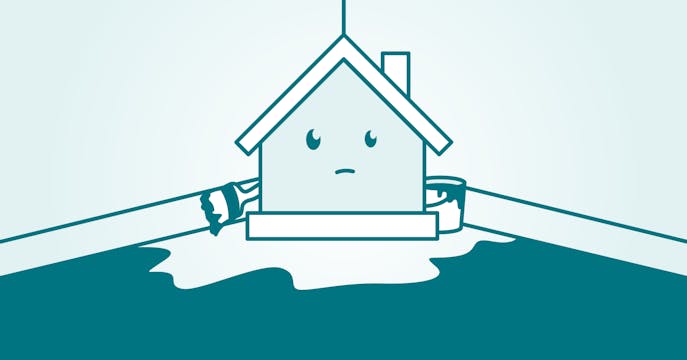Your personal renewal alarm clock.
We make it easy to schedule your renewal reminder, notifying you when it's your time to start the process. Set your renewal alarm here!
Lowest Mortgage Rate in Canada. Starting from 2.49%
Not literally, but kind of.
If you don't renew your mortgage in time, you could lose cash and maybe some sleep. Here's how and why you want to avoid this renewal hassle.
Are you waiting as long as possible for rates to go lower before you renew? Or are you super busy, thinking that when you can get to it, your renewal will be a quick click and done?
Hitting the (renewal) snooze button can make you late. And your renewal process may not be as quick as you think.
You could end up paying more, and you may not have enough time to make changes you may need for your upcoming term — like a refinance to take out more funds, or switching your mortgage to another lender to save some cash.
Here's how long you ideally need, why you should allow time for your renewal decision, and what happens if you miss your renewal date.
We make it easy to schedule your renewal reminder, notifying you when it's your time to start the process. Set your renewal alarm here!
Not sure when your mortgage matures? It's a good idea to keep track — especially if you have a complicated relationship with time (aka it flies too fast for your liking). Don't rely on your lender to notify you with enough time for a renewal process that prioritizes your needs and savings. If your mortgage contract expires, your lender will profit from the chaos.
Where can you find your mortgage renewal (maturity) date?
If you're unsure, call your bank rep for the exact date.
When you find your renewal date, mark 4 months ahead on your calendar, which is when you can technically re-sign or switch lenders without paying a penalty to break your term.
Or, set up a friendly reminder with our free renewal reminder tool — and you'll get a notice that your mortgage is now in its renewal window.
The easiest and fastest renewal process is to auto-renew with your current lender, provided you're happy with the rate and options offered for your next term.
But be careful that you're not readily accepting a higher rate or more restrictive conditions.
Have your mortgage or financial needs changed? Your situation is unique — and you may want a mortgage that fits your life as it is now, or for what you're planning next, versus where you were a few months or years ago when you last signed with your lender.
For example, you may want to:
Needing or wanting changes can take more time, or there may be complications that can delay your renewal process for any number of valid (or human-fallible) reasons.
Taking too long to start the renewal process
Taking out extra funds from home equity (a refinance)
Lowering payments through an extended amortization (a refinance)
Wanting to pay down a lump sum to reduce payments
Switching to another lender for a better rate or mortgage
Delay in signing a renewal acceptance with current or new lender
Delay in providing required docs or info
Not contacting a lawyer, if needed for a title transfer (for a switch)
Last-minute mortgage changes
Miscommunication regarding renewal details
Request for more details for a switch approval (e.g. need a property appraisal)
Unforeseen interruptions in 3rd-party processes (e.g. with a lawyer or another lender; personnel time off or schedule conflicts)
Not receiving the Mortgage Payout Statement from a new lender in time (for a switch)
Issues in resolving 3rd-party details, such as with a default mortgage insurer
Client financial details that come to light and require extra work to resolve
Lender declines to offer you a renewal
You're likely to pay more and stress more.
Your mortgage contract will lapse into an open or closed term at a much higher rate if your current lender doesn't receive a signed renewal agreement, or the mortgage isn't paid out on or before the maturity date.
The higher rate is due to both the admin hassle the lender takes on and the extra costs to carry your mortgage in the interim.
The length and terms of the interim mortgage will depend on the lender, with the most common ones being:
The lapse means you might also spend needless time dealing with the details and ensuring your mortgage contract gets back on track (banks can be a tricky bunch if you or an expert broker is trying to blow an airhorn to get things moving).
So, it makes sense to keep track of your renewal date to help ensure a smooth and stress-free process.
An open mortgage allows you to make changes at any time, such as a larger pre-payment than is typically allowable or choosing a different rate type (variable vs. fixed mortgage rate) without incurring a penalty. Not all lenders offer this product for your interim renewal lapse, but if they do, you won't be locked into paying a higher rate for a set time. You'll be able to transition to your mortgage of choice once the renewal process finalizes.
A closed mortgage means you can't make significant changes without breaking the 'new' contract, and you'll pay a pre-payment penalty if you choose not to wait out the interim term to renew into a better mortgage product.
A convertible mortgage is a closed mortgage that retains a penalty for most major changes, but allows the flexibility to convert to a longer term or different rate type.
Assuming a $500K mortgage and 20-year remaining amortization, at a market rate of 4.5%, your monthly payments would be about $3,152.
Lapsing into a temporary term at Prime + 3.0% (and Prime is 4.95%) for a rate of 7.95%, your monthly payment would rise to $4,126:
Plus, you may pay extra fees or a penalty due to the renewal delay (e.g. if you realize you need extra funds or your lender charges other admin costs).
Is your mortgage contract with a federally regulated financial institution, like a bank or non-bank lender? It must provide you with a renewal offer (also called a renewal statement) at least 21 days before the end of your existing term.
Ideally, however, you should give yourself at least a month for your renewal process to help ensure you won't hit any snags that could result in additional time needed to resolve them.
Have you suddenly realized your mortgage renewal date is close at hand? Don't panic! Contact an expert True North broker, and we'll do everything possible to help expedite your process. Don't just auto-accept your renewal offer, thinking there's not enough time.
You can typically start the mortgage renewal process up to 4 months (120 days) before your current term ends, allowing you ample time to explore options and potentially secure a better rate or mortgage. An early renewal typically means breaking your term, though you may be able to get a blended mortgage rate, depending on the lender and your situation.
If you haven't received your renewal offer yet (it may be sitting in your online account), contact your lender for the statement.
Related Topic: How much will it cost to break your mortgage?
Ultimately, deciding whether to renew at the start of your 4-month renewal period or wait a little longer depends on your personal financial goals and risk tolerance.
If you think rates may be going up, renewing on the earlier side can help you avoid added interest costs. On the flip side, if you think rates may decrease, waiting until 4-6 weeks before your renewal date may provide the opportunity to get a lower mortgage rate.
How a True North broker helps you watch rates during your renewal period:
Not having to watch rates yourself is one of the most compelling reasons to contact a True North broker right away.
In most cases, as long as you've made all your payments on time, there's no immediate reason to think your current lender would deny your mortgage renewal.
But yes, your lender isn't obligated to offer you a renewal and may decide not to. In this case, the lender must notify you at least 21 days before the end of your term.
A lender's reasons for not renewing a mortgage can include:
Instead of denying you a renewal contract, you may instead face a much higher mortgage rate to stay.
If you're unable to renew with your current lender or are facing a significantly higher rate, consider consulting an expert broker with access to several alternative and private lenders that may be able to extend a mortgage approval.
At True North, our expert brokers have the speed and flexibility to source the right mortgage solution at your best possible rate — ideally, in time for the mortgage maturity date.
If you need a short-term mortgage solution to see you through, you can work with your broker to get back with a traditional (A) lender for your next renewal.
You may be comfortable with the temporary higher rate and term, especially if you're lapsing into a short-term open or convertible mortgage, both of which allow you to forego a penalty by signing to a longer term.
If hitting the '10 more minutes' button is your thing, we suggest applying online or calling a highly trained True North mortgage broker as soon as possible in your renewal period to ensure your mortgage doesn't sleep past better rates or options.
We rise early and grind the lenders and rates so you don't have to. We've been here for almost two decades, garnering an impressive number of 5-star reviews, offering you a better (savings) choice (in your preferred language) than silently signing with your bank.



Various tools and functions of this website perform calculations and provide cost estimates. These tools are designed for illustrative purposes only and make many assumptions that may not reflect all situations. Please use these tools in collaboration with a True North Mortgage agent. True North Mortgage does not guarantee the accuracy, reliability or completeness of these tools or calculations.

Don't sign without talking to us! Show us your renewal notice — we’ll beat it.

Your bank wants you to stay (mum) and accept your first renewal offer. Don't, until you read this.

Higher rates painting you into a budget corner? Get help to find a way out.
